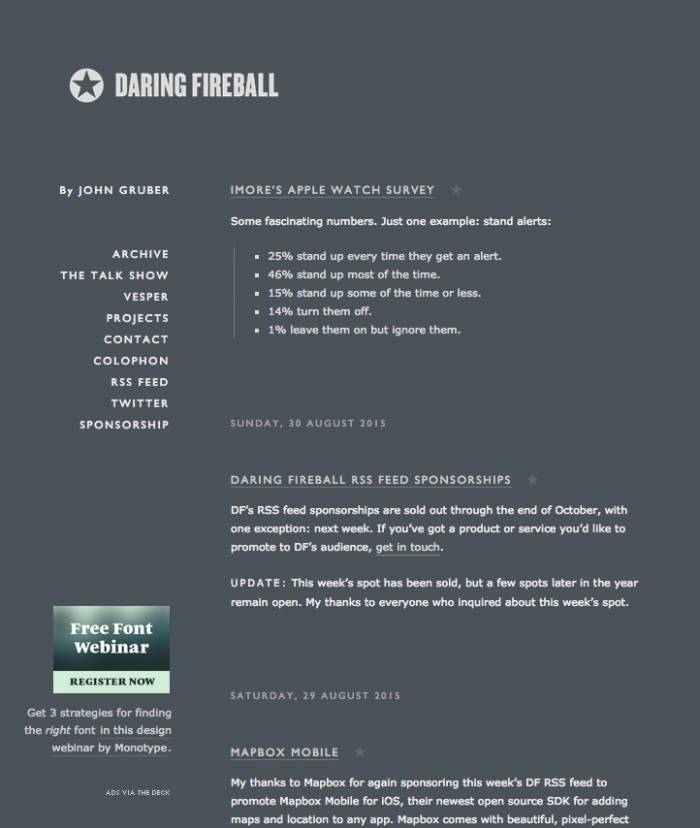Living with Bullshit
Last week I launched Death to Bullshit, a site and blog that explore the themes of information, bullshit, and craft. On the site, I argue that people are bombarded by more information–and bullshit–than ever. People understandably want to minimize the amount of bullshit they’re exposed to, so we as creators should take heed and make experiences that respect people and their time.
Overall, reactions to the site have been quite positive, but naturally there have been a few comments (which I know, I know I shouldn’t read) that latch onto one minor point (“But I like 24-hour news networks!”) and use it to write off the entirety of the message.
One of the dismissive comments that deserves discussion goes a little something like “lol this guy obviously doesn’t understand that businesses need to make money”. This is on par with other nonsense positions like “some people enjoy hunting, so therefore mentally-ill, convicted felons should be allowed to purchase assault rifles” and “if we let the gays marry I should be allowed to marry my refrigerator!”
Take any issue or cause, point out a contrarian-yet-possibly-legit exception, take it to its illogical extreme, and use it to shut down any attempt of reform or conversation. Normally I shrug these comments off, after all in my case it’s just dumb comments about a website, but because this is the current depressing state of discourse and politics in this country, I had a relatively severe allergic reaction to it.
The Intersection of Bullshit and Business
But let’s come back to intersection of bullshit and business. Here’s a genuine, non-dismissive framing of the question from Mark Boulton:
@brad_frost This is great! But… serious question. How do we stop the bullshit, when the bullshit pays the bills? However bad it is.
— Mark Boulton (@markboulton) August 26, 2015
This is a fantastic question, and deserves to be answered. The short answer is: everything in moderation, friends.
There is a massive difference between this:
And this:
Both of these sites use display advertising to generate money for their businesses. One of these sites is doing this in an unobtrusive manner, and the other is actively punching its users in the face. I’ll let you decide which site is the former and which is the latter.
No doubt there’s some legit intention behind each category of bullshit, but what I’m fighting for is for folks to use their judgement and strike a healthy balance between solving business problems and respecting their users and their time. For example:
- Advertising is a necessary evil, however there’s a difference between paying the bills and straight-up assaulting your users.
- Tracking scripts provide useful insights (I use Google Analytics on nearly all my sites to better understand how people are using my sites), but maybe you don’t need to include 22 of them.
- Email marketing can be an effective way to connect with your audience and generate sales, but maybe you don’t need to flood their inboxes with 17 emails a week.
- Popups and interstitials might be an effective way to get people to sign up for something (or not), but maybe there are alternative patterns that would be equally effective and less annoying to your users?
- And so on and so on
The invisible cost of bullshit
One of my main issues with the whole “bullshit is necessary for business” comment is that it assumes the bottom line is the only thing that matters. This mentality, combined with a short-sighted, A/B test mentality, leads to an unhealthy tic where businesses constantly shout “DOES THIS GENERATE MORE PROFIT? YES OR NO? YES OR NO!?!?!” and this tic ends up trumping every other aspect of the experience.
But allowing only one metric to influence behavior can be disastrous. Let’s say a city cared about lowering crime rates, which is undoubtedly a nobel pursuit. The city notices only a handful of neighborhoods are responsible for the majority of the crime. There are a few ways to deal with this issue. One way to accomplish their goal is to simply level these parts of the city–just straight burn ’em all to the ground. Would this lower the crime rate? Most likely yes. But any non-psychopathic person should view this solution as absolutely abhorrent, for reasons I shouldn’t have to spell out.
Products and services need to recognize that adopting bullshitty practices may very well lead to concrete, short-term, quantifiable increases in profit. But at what cost? How many times will people x out of your popups before they stop following you on Twitter? How many e-commerce emails will users endure before they go desperately hunting for the tiny unsubscribe button at the footer of the email? How many scripts will you shove down your users’ throats before they seek the same content or functionality from a place that gives them what they want in a reasonable time?
How willing are you to piss off your users?
We must understand people are enduring bullshit in every aspect of their lives. Every time they try to pay their bills. Every time they have to fill out yet another form. Every time they try to read the news of the day. The result is death by a million paper cuts. I have no doubt that creators who break the mold and give people experiences that respect them and their time will be rewarded in the long run.

